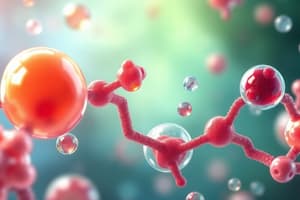Podcast
Questions and Answers
Which of the following are the 4 biomolecules?
Which of the following are the 4 biomolecules?
- Vitamins
- Carbohydrates (correct)
- Lipids (correct)
- Nucleic Acids (correct)
- Proteins (correct)
What is a monomer?
What is a monomer?
A building block
Why are biomolecules important?
Why are biomolecules important?
Which of the following are examples of carbohydrates?
Which of the following are examples of carbohydrates?
What is the function of carbohydrates?
What is the function of carbohydrates?
What is the monomer of carbohydrates?
What is the monomer of carbohydrates?
What are lipids also known as?
What are lipids also known as?
What are the two building blocks or monomers for lipids?
What are the two building blocks or monomers for lipids?
Which of the following are examples of lipids?
Which of the following are examples of lipids?
What is the function of lipids?
What is the function of lipids?
Which of the following are examples of proteins?
Which of the following are examples of proteins?
What is the function of proteins?
What is the function of proteins?
What is the monomer of proteins?
What is the monomer of proteins?
Why is DNA important?
Why is DNA important?
Which of the following are examples of nucleic acids?
Which of the following are examples of nucleic acids?
What is the monomer of nucleic acids?
What is the monomer of nucleic acids?
What is the function of DNA?
What is the function of DNA?
What is the function of RNA?
What is the function of RNA?
Where are nucleic acids found?
Where are nucleic acids found?
What is a carbohydrate chain?
What is a carbohydrate chain?
What is a lipid chain?
What is a lipid chain?
What is a protein chain?
What is a protein chain?
What is a nucleic acid?
What is a nucleic acid?
Flashcards are hidden until you start studying
Study Notes
Biomolecules Overview
- Four main types of biomolecules: Carbohydrates, Lipids, Proteins, and Nucleic Acids.
Monomers
- A monomer is defined as the basic building block of larger biomolecules.
Importance of Biomolecules
- Critical for metabolic processes, cell structure, energy storage, and genetic information transmission.
Carbohydrates
- Examples include starches (such as bread and pasta) and sugars (like table sugar and glucose).
- Main function is to store energy.
- Monomer form is monosaccharides.
Lipids
- Also referred to as fats.
- Two primary building blocks: fatty acids and glycerol.
- Examples include fats, oils, butter, cholesterol, and steroids.
- Functions include storing long-term energy, cushioning and protecting organs, insulating the body, and forming cell membranes.
Proteins
- Numerous examples include meats, beans, cheese, eggs, nuts, and stomach enzymes such as pepsin.
- Main functions consist of building and repairing muscle, facilitating body movement, and defending against germs or viruses.
- Monomer unit is amino acids.
Nucleic Acids
- DNA plays a vital role; without it, a cell cannot synthesize essential proteins for life.
- Examples include DNA and RNA.
- Nucleotide serves as the monomer for nucleic acids.
- DNA functions in storing and transferring genetic information.
- RNA codes for amino acids and acts as a messenger between DNA and ribosomes for protein synthesis.
- Nucleic acids are present in all forms of life.
Chains of Biomolecules
- Carbohydrate, lipid, and protein chains are composed of their respective monomers but need further elaboration.
- Nucleic acids form extensive chains of nucleotides that create the overall structure of DNA and RNA.
Studying That Suits You
Use AI to generate personalized quizzes and flashcards to suit your learning preferences.




